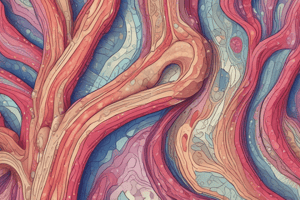Podcast
Questions and Answers
Which type of tissue covers body surfaces, lines hollow organs, body cavities, and ducts, and forms glands?
Which type of tissue covers body surfaces, lines hollow organs, body cavities, and ducts, and forms glands?
- Muscle tissue
- Epithelial tissue (correct)
- Nervous tissue
- Connective tissue
Which type of tissue protects and supports the body and its organs, binds organs together, stores energy reserves as fat, and provides immunity?
Which type of tissue protects and supports the body and its organs, binds organs together, stores energy reserves as fat, and provides immunity?
- Muscle tissue
- Nervous tissue
- Connective tissue (correct)
- Epithelial tissue
Which type of tissue is responsible for movement and generation of force and heat?
Which type of tissue is responsible for movement and generation of force and heat?
- Epithelial tissue
- Nervous tissue
- Connective tissue
- Muscle tissue (correct)
Which type of tissue initiates and transmits action potentials (nerve impulses) that help coordinate body activities?
Which type of tissue initiates and transmits action potentials (nerve impulses) that help coordinate body activities?
Which embryological origin is associated with the sensory epithelia of the eye, ear, and nose?
Which embryological origin is associated with the sensory epithelia of the eye, ear, and nose?
Which of the following is an example of an epithelial tissue in the human body?
Which of the following is an example of an epithelial tissue in the human body?
Which embryological origin is responsible for the formation of the lining of the respiratory and gastrointestinal tracts?
Which embryological origin is responsible for the formation of the lining of the respiratory and gastrointestinal tracts?
Which structure is responsible for the attachment and support of epithelial tissue?
Which structure is responsible for the attachment and support of epithelial tissue?
Which of the following functions is NOT performed by epithelial tissue?
Which of the following functions is NOT performed by epithelial tissue?
Which of the following is an example of a specific function of epithelial tissue?
Which of the following is an example of a specific function of epithelial tissue?
Which of the following is a characteristic of epithelial tissue?
Which of the following is a characteristic of epithelial tissue?
Which of the following is a specialized structure found on the apical surface of epithelium?
Which of the following is a specialized structure found on the apical surface of epithelium?
Which of the following is a function of the basement membrane?
Which of the following is a function of the basement membrane?
Which embryological origin is responsible for the lining of the anterior tongue, hard palate, and sides of the mouth?
Which embryological origin is responsible for the lining of the anterior tongue, hard palate, and sides of the mouth?
Which of the following is NOT a specific function of epithelial tissue?
Which of the following is NOT a specific function of epithelial tissue?
Which embryological origin is responsible for the formation of the female and male urethra?
Which embryological origin is responsible for the formation of the female and male urethra?
Which of the following is NOT a characteristic of epithelial tissue?
Which of the following is NOT a characteristic of epithelial tissue?
Which type of tissue is responsible for the reduction of visceral friction and protection of serous membranes?
Which type of tissue is responsible for the reduction of visceral friction and protection of serous membranes?
Which of the following is a specific function of epithelial tissue?
Which of the following is a specific function of epithelial tissue?
Which structure is responsible for the guidance of cell migration during development and wound healing?
Which structure is responsible for the guidance of cell migration during development and wound healing?
Which type of connective tissue is responsible for organ padding and energy storage?
Which type of connective tissue is responsible for organ padding and energy storage?
Which type of connective tissue has collagen fibers arranged in parallel bundles with fibroblasts in between and is tough and pliable?
Which type of connective tissue has collagen fibers arranged in parallel bundles with fibroblasts in between and is tough and pliable?
Which type of connective tissue can resist tension from any direction and is found in the white of the eyeball, dermis of the skin, and cardiac valves?
Which type of connective tissue can resist tension from any direction and is found in the white of the eyeball, dermis of the skin, and cardiac valves?
Which type of connective tissue allows for organ stretching and is found in lung tissue, true vocal cords, and walls of large arteries?
Which type of connective tissue allows for organ stretching and is found in lung tissue, true vocal cords, and walls of large arteries?
Which type of connective tissue forms the stroma (scaffold) of certain organs such as the liver and spleen, and brings the cells of smooth muscle together?
Which type of connective tissue forms the stroma (scaffold) of certain organs such as the liver and spleen, and brings the cells of smooth muscle together?
Which type of connective tissue is highly vascularized and consists of adipocytes specialized for storing triglycerides?
Which type of connective tissue is highly vascularized and consists of adipocytes specialized for storing triglycerides?
Which type of connective tissue has more blood vessels and mitochondria and is responsible for heat generation in newborns?
Which type of connective tissue has more blood vessels and mitochondria and is responsible for heat generation in newborns?
Which type of connective tissue consists of fine interlacing reticular fibers and reticular cells, and forms the stroma of certain organs?
Which type of connective tissue consists of fine interlacing reticular fibers and reticular cells, and forms the stroma of certain organs?
Which type of connective tissue is found in the oral cavity and is responsible for providing support and protection?
Which type of connective tissue is found in the oral cavity and is responsible for providing support and protection?
Which type of connective tissue is used in gingival recession surgery to implant connective tissue from the palate?
Which type of connective tissue is used in gingival recession surgery to implant connective tissue from the palate?
Which type of connective tissue is responsible for heat generation in newborns and has more blood vessels and mitochondria?
Which type of connective tissue is responsible for heat generation in newborns and has more blood vessels and mitochondria?
Which type of connective tissue is responsible for organ padding and energy storage?
Which type of connective tissue is responsible for organ padding and energy storage?
Which type of connective tissue forms the stroma of certain organs, brings the cells of smooth muscle together, and performs filtration to remove dead cells and microbes?
Which type of connective tissue forms the stroma of certain organs, brings the cells of smooth muscle together, and performs filtration to remove dead cells and microbes?
Which type of connective tissue allows for organ stretching and is found in lung tissue, true vocal cords, and walls of large arteries?
Which type of connective tissue allows for organ stretching and is found in lung tissue, true vocal cords, and walls of large arteries?
Which type of connective tissue is found in the oral cavity and provides support and protection?
Which type of connective tissue is found in the oral cavity and provides support and protection?
Flashcards are hidden until you start studying
Study Notes
Types of Tissues and Their Functions
- Epithelial Tissue: Covers body surfaces, lines hollow organs, body cavities, and ducts, and forms glands.
- Connective Tissue: Protects and supports the body and its organs, binds organs together, stores energy as fat, and provides immunity.
- Muscle Tissue: Responsible for movement, generation of force, and heat production.
- Nervous Tissue: Initiates and transmits action potentials (nerve impulses) to coordinate body activities.
Embryological Origins
- Ectoderm: Associated with sensory epithelia of the eye, ear, and nose.
- Endoderm: Forms the lining of the respiratory and gastrointestinal tracts.
- Ectoderm (specifically): Responsible for the lining of the anterior tongue, hard palate, and sides of the mouth.
- Mesoderm: Involved in the formation of the female and male urethra.
Functions and Characteristics of Epithelial Tissue
- Functions: Includes secretion, absorption, excretion, sensation, and protection.
- Characteristics: Avascular, has a high rate of regeneration, cellularity, polarity (apical and basal surfaces), and specialized cell junctions.
- Specialized Structures: Includes microvilli and cilia found on the apical surface.
Basement Membrane
- Functions for attachment, support of epithelial tissue, and filtration.
Connective Tissue Types and Features
- Loose Connective Tissue: Responsible for organ padding and energy storage.
- Dense Regular Connective Tissue: Composed of parallel collagen fibers; provides strength and support.
- Dense Irregular Connective Tissue: Resists tension from multiple directions; found in the dermis and other structures.
- Elastic Connective Tissue: Allows for organ stretching; present in lungs, true vocal cords, and large arteries.
- Reticular Connective Tissue: Forms the stroma of organs like the liver and spleen and filters pathogens and dead cells.
- Adipose Tissue: Highly vascularized, consists of adipocytes, important for storing triglycerides and thermogenesis in newborns.
Specific Applications
- Connective Tissue in Surgery: Used in gingival recession surgery to implant tissue from the palate.
- Support Roles: Connective tissues provide structural support and protection in the oral cavity and other areas.
Studying That Suits You
Use AI to generate personalized quizzes and flashcards to suit your learning preferences.




